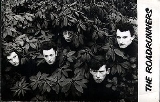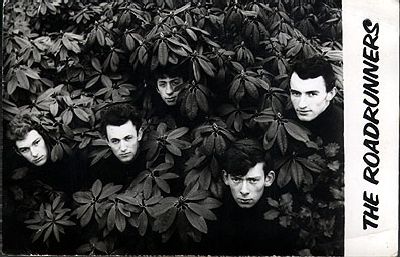
Liverpool Roadrunners
Encyclopedia
The Roadrunners were a band that emerged from the burgeoning music scene in 1960s Liverpool
. (They were billed either as The Roadrunners or as The Road Runners. The word "Liverpool" has been added to distinguish them from other bands who subsequently used the name.)
Unlike many of their contemporaries, they specialised in a Chicago/Muddy Waters
/Bo Diddley
style of Rhythm and Blues - a genre of music which was more popular in the south of England at the time, led by the up-and-coming Rolling Stones.
Bill Harry, editor of Mersey Beat
, recollects that George Harrison
once said that "The Stones are good - almost as good as the Roadrunners".
The band was resident at the Hope Hall (now the Everyman Theatre). Here they entertained students from the nearby university and art school. They also took part in "happenings" organised by Liverpool poet Adrian Henri
.
The band also performed at the Cavern Club. They were invited to support the The Beatles
on their last Cavern gig on 3 August 1963.
Two trips were made to Hamburg's Star Club, and two albums were recorded.

Inevitably there were changes in the line-up. The first being the addition of two sax players (Johnny Phillips and Nick la Grec) in time for the second Hamburg engagement. The band have commented that, by 1964, "everyone was jumping on the R&B bandwagon, so it was time to move on". Their second album reflects a move towards a more contemporary soul/blues sound in the manner of James Brown
.
Success in Britain was elusive. Recording deals were talked about, but never seemed to happen.
The Roadrunners make two contributions to the recording of the grandly-named "First Annual R&B Festival" (1964) and also cut an e.p. to help raise money for Liverpool University's rag or "panto" week (a charity fund raising event).
Mike Hart left the band to pursue a solo career, recording two albums for John Peel
's "Dandelion" label. (Peel was a British radio presenter who championed the innovative rather than the commercially successful.) In 1980 he began work on a third solo project. Five tracks were recorded, but none were released. They have been rediscovered, remastered and put online via the Roadrunners' website.
The band finally split in 1966.
In an article published in the Liverpool Post newspaper, 31 May 2011, poet Roger McGough stated that his and the Beatles' favourite band of the time was the Roadrunners.
Liverpool
Liverpool is a city and metropolitan borough of Merseyside, England, along the eastern side of the Mersey Estuary. It was founded as a borough in 1207 and was granted city status in 1880...
. (They were billed either as The Roadrunners or as The Road Runners. The word "Liverpool" has been added to distinguish them from other bands who subsequently used the name.)
Unlike many of their contemporaries, they specialised in a Chicago/Muddy Waters
Muddy Waters
McKinley Morganfield , known as Muddy Waters, was an American blues musician, generally considered the "father of modern Chicago blues"...
/Bo Diddley
Bo Diddley
Ellas Otha Bates , known by his stage name Bo Diddley, was an American rhythm and blues vocalist, guitarist, songwriter , and inventor...
style of Rhythm and Blues - a genre of music which was more popular in the south of England at the time, led by the up-and-coming Rolling Stones.
Bill Harry, editor of Mersey Beat
Mersey Beat
Mersey Beat was a music publication in Liverpool, England in the early 1960s. It was founded by Bill Harry, who was one of John Lennon's classmates at Liverpool Art College...
, recollects that George Harrison
George Harrison
George Harrison, MBE was an English musician, guitarist, singer-songwriter, actor and film producer who achieved international fame as lead guitarist of The Beatles. Often referred to as "the quiet Beatle", Harrison became over time an admirer of Indian mysticism, and introduced it to the other...
once said that "The Stones are good - almost as good as the Roadrunners".
The band was resident at the Hope Hall (now the Everyman Theatre). Here they entertained students from the nearby university and art school. They also took part in "happenings" organised by Liverpool poet Adrian Henri
Adrian Henri
Adrian Henri was a British poet and painter best remembered as the founder of poetry-rock group The Liverpool Scene and as one of three poets in the best-selling anthology The Mersey Sound, along with Brian Patten and Roger McGough. The trio of Liverpool poets came to prominence in that city's...
.
The band also performed at the Cavern Club. They were invited to support the The Beatles
The Beatles
The Beatles were an English rock band, active throughout the 1960s and one of the most commercially successful and critically acclaimed acts in the history of popular music. Formed in Liverpool, by 1962 the group consisted of John Lennon , Paul McCartney , George Harrison and Ringo Starr...
on their last Cavern gig on 3 August 1963.
Two trips were made to Hamburg's Star Club, and two albums were recorded.

Line-up
The original line-up was:- Mike (a.k.a.'Enry) HartMike Hart (poet)Mike Hart was a Liverpool based singer/songwriter and poet.In 1962 he founded the band The Roadrunners, before leaving in 1965 to join The Liverpool Scene, a poetry and music collective, with Adrian Henri, Andy Roberts and Mike Evans...
- Guitar, Sax, Vocals - Pete Mackey - Bass, Vocals
- Dave Boyce - Drums
- John Peacock - Piano
- Dave Percy - Guitar, Vocals
Inevitably there were changes in the line-up. The first being the addition of two sax players (Johnny Phillips and Nick la Grec) in time for the second Hamburg engagement. The band have commented that, by 1964, "everyone was jumping on the R&B bandwagon, so it was time to move on". Their second album reflects a move towards a more contemporary soul/blues sound in the manner of James Brown
James Brown
James Joseph Brown was an American singer, songwriter, musician, and recording artist. He is the originator of Funk and is recognized as a major figure in the 20th century popular music for both his vocals and dancing. He has been referred to as "The Godfather of Soul," "Mr...
.
Success in Britain was elusive. Recording deals were talked about, but never seemed to happen.
The Roadrunners make two contributions to the recording of the grandly-named "First Annual R&B Festival" (1964) and also cut an e.p. to help raise money for Liverpool University's rag or "panto" week (a charity fund raising event).
Mike Hart left the band to pursue a solo career, recording two albums for John Peel
John Peel
John Robert Parker Ravenscroft, OBE , known professionally as John Peel, was an English disc jockey, radio presenter, record producer and journalist. He was the longest-serving of the original BBC Radio 1 DJs, broadcasting regularly from 1967 until his death in 2004...
's "Dandelion" label. (Peel was a British radio presenter who championed the innovative rather than the commercially successful.) In 1980 he began work on a third solo project. Five tracks were recorded, but none were released. They have been rediscovered, remastered and put online via the Roadrunners' website.
The band finally split in 1966.
In an article published in the Liverpool Post newspaper, 31 May 2011, poet Roger McGough stated that his and the Beatles' favourite band of the time was the Roadrunners.

